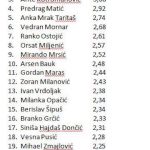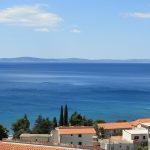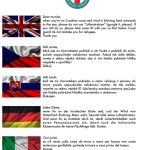April 7, 2018 – We are delighted to welcome Borna Sor to TCN. Part of the legendary News Bar team and the banned Montirani Proces, Borna will be helping us with our new direction, through a mix of writing video and podcasting. He starts with a look at the history of Croatian political satire.
„Two Croats – three parties.“ – A. G. Matoš
If you ask the average citizen of Croatia, he will probably tell you how he finds Serbs or Bosnians to be funnier than Croats. How we are just not funny. Croatians don’t have a sense of humor, they will tell you, and even if they have one – it sucks.
However, this is a weird political semantics issue. If you ask a Dalmatian, he will tell you of great Dalmatian humorists of centuries past, writers, actors, directors, and journalists. People who were not just witty, but pillars of society. The soul of their community. From the times of Roman emperors to Facebook pages like Čača se vrača, the Adriatic swells with pride.
Marin Držić is diety in Dubrovnik, and Miljenko Smoje a mythological titan in Split.
In the north, humor was the main force of mass emancipation in the 19th century during the Croatian national revival. Writers like Tituš Brezovački and A.G. Matoš are not as well remembered as their quotes. „I regret times when I’ve sinned, even more, times when I didn’t.“
„Gruntovčani“ is still remembered as the hit show in the north. Done in a dialect hard for everyone to understand.
Zagreb will not stop harassing you with how „Tko pjeva zlo ne misli“ is the best, best, BEST!!! comedy movie ever made! (No-one outside Zagreb agrees)
Every region has something they find funny and humorous. I bet Istria has some very funny goats, Lika loves Tesla jokes, and Slavonians are enjoying Dubliners and their Celtic puns.
But they don’t find each other always funny.
The point is, Croats don’t have a sense of humor, because there is no Croatian humor. Or to clarify, Croatian humor is mosaical, with no clear domination, sometimes shifting from comedians like Željko Pervan from Zagreb, to GitakTV crew from Split. To be funny, it had to be honest and true, so always keeping regional aspects of humor, slang, and mentality.
Not to say there are no universal jokes and comedy in Croatia, but the barrier is clear. It is cultural and linguistic. Croatian dialects are sometimes like a foreign language. Every time a rapper from Split makes a new song, half of the country reaches for the dictionary. And all of this is great because it enriches our culture, but how come we never made the intracultural bridge?
I think the answer lies in Croatian political satire.
Of all the greats I’ve mentioned above, one thing brings them together. Satire. Not just any satire. But the political one. Not the one that just makes you laugh or think, but the one that demands you to act. Satire that is used to start the fire or to loudly yell „the Emperor is naked!“.
And Emperors don’t like that. Not just them. Kings. Lords. Dictators. Presidents. They don’t like fires or their proverbial dick pics being exposed.
Marin Držić, the finest Dubrovnik Renaissance playwright and prose writer, was mocking the lords in his comedy. He had to leave the city….or be thrown to the Dragons. Dubrovnik-style.
One of the first satirical feuilletons “Zvekan” (Rascal) was printed by the first Croatian political party, the party of Rights, at the end of the 19th century. One of the many ways of fighting the imperial oppression and Hungarian nationalism. The empire was not pleased, but before all the jokers could be punished, some guy who was eating a sandwich shot the archduke in Sarajevo and made the whole world angry.
In the Kingdom of Yugoslavia, when Croatian politician Ivan Pernar satirically asked the cost of veteran blood, when they demand so much from the country they shed it for, he was shot in the middle of the Parlament.
That was the last year of democracy for the longest of times. Kings, Dictators, and Presidents changed, all having one thing in common. Fighting against free speech. So satire needed to be hidden. And where best to hide it, but in the local dialect and regional jokes. Sometimes hidden more, sometimes less, depending on the decade and foreign aid, satire was whispering „the Emperor is naked!“ in the Dalmatian jokes of „Malo misto“, or in the Kajkavian dialect of „Gruntovčani“.
And Croats loved satire, more than other types of humor. It suited their political cynicism, it was the favored weapon of their cultural arrogance. It still is, to be honest. When asked why they find Bosnians and Serbs funnier, half of them will tell you „It is the way they sound“. Something to think about, even if it’s meant like a compliment.
But it had to be hidden and divided, never being portrayed as something that is mocking the system directly. And when it did, it was stopped. Even before people knew, and for the most part has stayed hidden until today. My favorite examples are the satirical video works of Nikša Fulgosi from 1971. One can be found on YouTube under the title „100 ljepotica na dan“ (see below) where he mocks pageant shows, nude magazines, and Yugoslav development. He does it with the manner and quality of today’s American TV satirists, like John Oliver, using video effect and videos of cats to make a point. In 1971! He was banned immediately. And the show was never aired.
But the fire burned. With Croatian independence came Feral Tribune. Books and books could be written about it, and have been. Split-based newspapers were the unruly jesters in King Tuđman’s court, but more than that. Not hiding, but in clear sight, screaming „the Emperor is naked!“ from news stands all over the country, they combined satire with investigative journalism. Still keeping their local charm. They were sued into oblivion, but they made the next step in the Croatian satirical experiment and opened the doors for the new generation.
And I am thankful to all of them. If the price of keeping the spirit of vigilance and free thought is that „Croats have no sense of humor“ then it is a price well paid.
There is still so much to do. Political culture needs to accept free speech and satire. When my colleagues from Montirani Proces and me were banned from national television in 2016. it showed political censorship is alive and well, even when it comes to humor. And it is maybe harder to defend political satire in a democratic society. Someone had to vote for the people in power, and they will not find you mocking their choices funny.
But to protect this beautiful Croatian tradition we need „bipartisan“ support. The best example for that is an interview I did with politician Ruža Tomašić. I am too liberal for her, and she is too conservative for me, and I don’t think we agree on many things. I was worried she would react poorly to my provocations and stop the interview after the first question, so I asked her if she is aware of the kind of job I do. She responded „ Satire. I know. I lived in Canada. It is a part of the culture, all politicians participate.“
Today Ottawa, tomorrow Zagreb.









